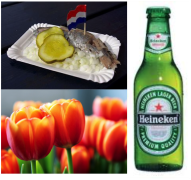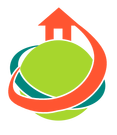
The Dutch are traders. It all started with a small fish found in the North Sea called Clupea harrengus, a.k.a. herring. The Dutch were fishermen and in 1385 they discovered a way gutting and salting the fish so that it would keep indefinitely and so began a centuries long tradition in trade.
This in turn led to the Dutch East India Company (Vereenigde Oostindische Compangie or VOC) which is regarded as the first multinational company ever and was responsible for setting up the first stock exchange in the world at Amsterdam. The VOC traded everything from spices to fabrics, and from opium to elephants and was the largest company in the world for close on 200 years. Not bad for such a small country.
This in turn led to the Dutch East India Company (Vereenigde Oostindische Compangie or VOC) which is regarded as the first multinational company ever and was responsible for setting up the first stock exchange in the world at Amsterdam. The VOC traded everything from spices to fabrics, and from opium to elephants and was the largest company in the world for close on 200 years. Not bad for such a small country.
The Dutch today are still heavily internationally orientated and well used to doing business with foreigners. Dutch companies such as Shell, Unilever, Phillips, ING, KLM, G-Star and TomTom are found all over the world. If you enjoy a beer there are very few countries where you won’t come across the red star of Heineken or one of its local brands. The Netherlands is the second largest agricultural exporter, and the world’s largest flower and bulb exporter (the Dutch produce 4.3 billion tulip bulbs per year). Dutch water management solutions are found the world over and some of the most popular video games are Dutch. The Big Brother television series was originally Dutch and The Voice is currently following suite and being adopted by broadcast companies worldwide.
This huge history of trade has of course left its mark on the modern day Dutch culture:
1. The Dutch have a talent for languages and will often quickly switch to English, German or French when they hear an accent (which can be very frustrating if you’re trying to learn Dutch!). As traders they had to learn to speak various languages in order to do business.
2. The Dutch are travellers; you’ll meet them the world over.
3. Fishing and trading were harsh businesses. This led to a kind of extreme independence and instinct for survival. The Dutch today are known for their independence and ‘get straight down to business’ attitudes. The Dutch love of hard facts (and aversion to ‘nonsense’) also comes from this merchant spirit.
4. The Dutch are not big risk takers, they take smaller calculated risks; all or nothing situations tend to be avoided. This again stems back to VOC days, trading was dangerous with many ships lost to storms or pirates. Merchants often took out shares in multiple ships rather than owning their own fleet, the risk was too great.
5. Finally, a policy of neutrality was adopted in the Netherlands; wars cost money and disrupted trading. The Netherlands tried to stay on good terms with as many nations as possible to ensure that business could go on uninterrupted. This policy of neutrality remained intact until the German invasion of 1940.
So, the next time you open a can of Heineken, take a Radox bath, use your Rabobank card to get some cash or switch on your Phillips 42 inch plasma HDTV just remember that it all started with a small little fish called herring.
This huge history of trade has of course left its mark on the modern day Dutch culture:
1. The Dutch have a talent for languages and will often quickly switch to English, German or French when they hear an accent (which can be very frustrating if you’re trying to learn Dutch!). As traders they had to learn to speak various languages in order to do business.
2. The Dutch are travellers; you’ll meet them the world over.
3. Fishing and trading were harsh businesses. This led to a kind of extreme independence and instinct for survival. The Dutch today are known for their independence and ‘get straight down to business’ attitudes. The Dutch love of hard facts (and aversion to ‘nonsense’) also comes from this merchant spirit.
4. The Dutch are not big risk takers, they take smaller calculated risks; all or nothing situations tend to be avoided. This again stems back to VOC days, trading was dangerous with many ships lost to storms or pirates. Merchants often took out shares in multiple ships rather than owning their own fleet, the risk was too great.
5. Finally, a policy of neutrality was adopted in the Netherlands; wars cost money and disrupted trading. The Netherlands tried to stay on good terms with as many nations as possible to ensure that business could go on uninterrupted. This policy of neutrality remained intact until the German invasion of 1940.
So, the next time you open a can of Heineken, take a Radox bath, use your Rabobank card to get some cash or switch on your Phillips 42 inch plasma HDTV just remember that it all started with a small little fish called herring.

 RSS Feed
RSS Feed
